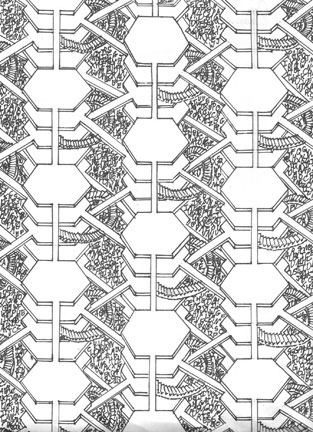This essay refers to an earlier version of libraryofbabel.info. Read an up-to-date description here.
It’s easy to imagine that shifting the Library of Babel from a physical structure to a virtual domain means the dream of a universal library is already within reach. It’s just as easy to forget that any virtual space requires a physical substrate, and that this places necessary limits on its expansion.
The impossible dimensions of a total library were already a theme in Kurd Lasswitz’ 1902 story “The Universal Library” (For more on Lasswitz see Alphabets & Irony). Lasswitz’ professor, expounding the properties of the universal library, offers the somewhat bizarre proposition that each 500-page volume it contains will be 2 cm thick. Even with these cramped bindings, his library of every permutation of 100 different characters over 1,000,000 spaces would total 2 x 102000000 centimeters laid end to end.

Given that a light year is about 1016 meters, Lasswitz’ universal library would stretch 2 x 101999982 light years. Now, the constant expansion of space places a limit on the reach of light itself throughout the universe. Beyond a certain limit known as the cosmological event horizon, the expansion of space outpaces the speed of light, and light from those distant reaches can never reach an observer, no matter how long they wait. This limit lies around 16 Gly today, or 1.6 x 1010 light years. Thus the vast majority of the total library, were anyone to attempt its analog realization, would not even be part of our known universe, but would rush away from us faster than its light could return. (My thanks to the helpful folks at physics stack exchange for some of this information. Adam Lee has also written some interesting reflections on the space of the Library of Babel here.)
When we shift to a digital library like ours, we trade the problems of the infinite for those of the infinitesimal, or at least the really large for the really small. libraryofbabel.info can create about 200,000 books a day. Our character set has 29 elements, and our books 1,312,000 characters. This yields 291312000 possible books, or approximately 101918666. At our current rate, it would take about 101918659 years to complete the library. Unfortunately for us, in only 12 billion years, or 1.2 x 1010, the sun will enter its red giant stage, expanding enough to consume the earth.

Another barrier is reached very quickly as our production grows - everything we generate must be stored. If we keep a backup (we do), we generate enough data to fill a 2 TB hard drive in five days. With the present availability of storage space, a complete universal library would require racks of hard drives which again outstrip the knowable universe, and the expense would be similarly astronomical.
What about the ever-increasing power of computer processors? According to Moore’s law, the number of transistors in an integrated circuit doubles every two years, and Kryder’s law presents parallel predictions about the growth of data storage. These are not natural laws, however, and any number of factors could intrude on their continued predictive success. For one, this increase has been accomplished by making components ever smaller, to the point where the atomic scale may pose an ultimate and fast-approaching limit to further progress. Even if exponential growth continued indefinitely, it would still be on the time scale of millions of years before our library was completed.
This can also be considered as a movement towards the infinitesimal. At present we are creating ~2 books/second. In order to create the library in, say, a century, we would need to create one book every 10-1918657 seconds.
So what exactly are we doing? I certainly have no expectation of this project ever resulting in a “complete” library, let alone in my lifetime (for essential reasons: see Alphabets & Irony). But just as the library can spur reflections in the form of a short story or thought experiment, it brings new ideas and a new intimacy when we seek to create and interact with what portion we can in this digital/virtual form.
For instance, when I began I expected to see much more output resembling the English language, or at least I expected that if I made a few million books, searching through them would yield a few sentences of passable English. The truth is much more as Borges presented it: an endless field of gibberish that one could search until their death without finding a single rational phrase, let alone what Borges’ librarians refer to as their “vindication.” But this result has brought its own peace of mind. The library is still an opportunity to reflect on cosmological and literary themes, still a project that can be carried on by future generations, for better or worse. It even has its own moments of poetry. Above all, browsing the library has become an exercise in better understanding irrationality (if I may be permitted an oxymoron), just as it should be.
